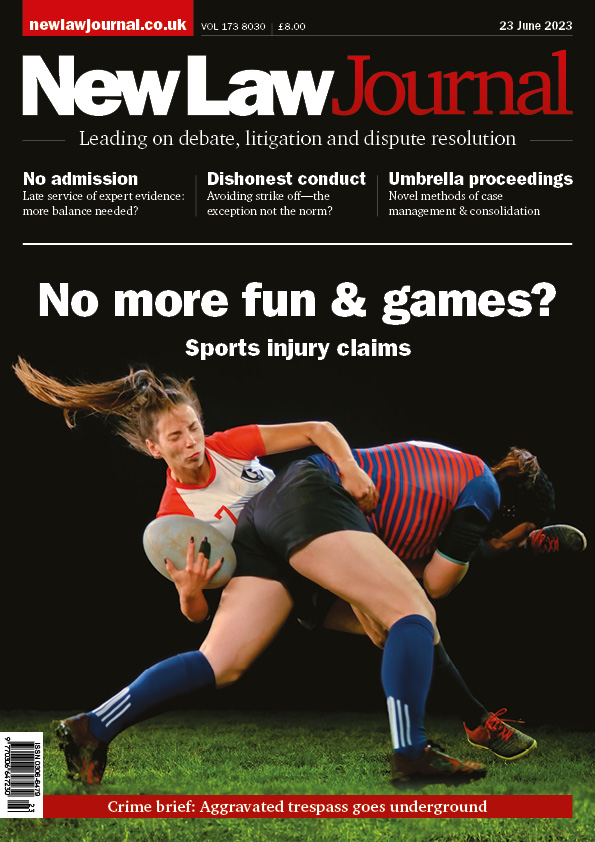THIS ISSUE

The Jackson reforms made the courts more cost-conscious and, consequently, stricter. In this week’s NLJ, Dr Chris Pamplin, editor of the UK Register of Expert Witnesses, asks whether a more balanced approach should be taken by courts which, ten years after Jackson, remain loathe to admit late expert evidence.
NLJ columnist Roger Smith reviews legal technology specialist Professor Richard Susskind’s latest book through an access to justice lens, in this week’s issue.
The construction of HS2 has provided work for criminal lawyers as well as construction engineers, writes NLJ columnist David Walbank KC, of Red Lion Chambers, in this week’s ‘Crime Brief’. Walbank looks at the recent case concerning protestors who tunnelled beneath Euston Square Gardens in central London.
Dishonesty is certainly in the headlines this week, but politics aside, what happens when solicitors are dishonest? In this week’s NLJ, Jessica Clay and Lucinda Soon examine the ‘exceptional circumstances’ which can save a dishonest solicitor from being struck off.
No matter the advances of legal tech in widening access to justice, there will always be a place for human advisers, as Roger Smith explains
When does dishonest conduct in the solicitors’ profession not lead to strike-off? Jessica Clay & Lucinda Soon consider some exceptional circumstances
Novel methods of case management & consolidation are emerging in the Competition Appeal Tribunal: Annabel Elliott considers the umbrella proceedings order one year on
Vijay Ganapathy discusses recent developments in sports injury & noise-induced hearing loss claims, plus the rules on limitation for professional negligence cases
Agency fees or expert fees? Masood Ahmed & Lal Akhter clarify the rules surrounding fees paid to a medical reporting organisation when assessing costs
Thus far, arguably the most significant output of the HS2 project has been a stream of litigation: David Walbank KC charts the path to judicial review
MOVERS & SHAKERS

Freeths—Ruth Clare
National real estate team bolstered by partner hire in Manchester

Farrer & Co—Claire Gordon
Partner appointed head of family team

mfg Solicitors—Neil Harrison
Firm strengthens agriculture and rural affairs team with partner return
NEWS
Conveyancing lawyers have enjoyed a rapid win after campaigning against UK Finance’s decision to charge for access to the Mortgage Lenders’ Handbook
The Crown Prosecution Service (CPS) has launched a recruitment drive for talented early career and more senior barristers and solicitors
Regulators differed in the clarity and consistency of their post-Mazur advice and guidance, according to an interim report by the Legal Services Board (LSB)
The Solicitors Act 1974 may still underpin legal regulation, but its age is increasingly showing. Writing in NLJ this week, Victoria Morrison-Hughes of the Association of Costs Lawyers argues that the Act is ‘out of step with modern consumer law’ and actively deters fairness
A Competition Appeal Tribunal (CAT) ruling has reopened debate on the availability of ‘user damages’ in competition claims. Writing in NLJ this week, Edward Nyman of Hausfeld explains how the CAT allowed Dr Liza Lovdahl Gormsen’s alternative damages case against Meta to proceed, rejecting arguments that such damages are barred in competition law







